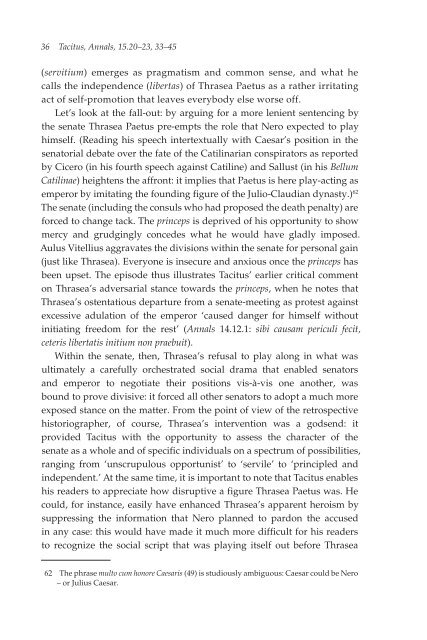Tacitus, Annals, 15.20-23, 33-45. Latin Text, Study Aids with Vocabulary, and Commentary, 2013a
Tacitus, Annals, 15.20-23, 33-45. Latin Text, Study Aids with Vocabulary, and Commentary, 2013a
Tacitus, Annals, 15.20-23, 33-45. Latin Text, Study Aids with Vocabulary, and Commentary, 2013a
Create successful ePaper yourself
Turn your PDF publications into a flip-book with our unique Google optimized e-Paper software.
(servitium) emerges as pragmatism <strong>and</strong> common sense, <strong>and</strong> what he<br />
calls the independence (libertas) of Thrasea Paetus as a rather irritating<br />
act of self-promotion that leaves everybody else worse off.<br />
Let’s look at the fall-out: by arguing for a more lenient sentencing by<br />
the senate Thrasea Paetus pre-empts the role that Nero expected to play<br />
himself. (Reading his speech intertextually <strong>with</strong> Caesar’s position in the<br />
senatorial debate over the fate of the Catilinarian conspirators as reported<br />
by Cicero (in his fourth speech against Catiline) <strong>and</strong> Sallust (in his Bellum<br />
Catilinae) heightens the affront: it implies that Paetus is here play-acting as<br />
emperor by imitating the founding figure of the Julio-Claudian dynasty.) 62<br />
The senate (including the consuls who had proposed the death penalty) are<br />
forced to change tack. The princeps is deprived of his opportunity to show<br />
mercy <strong>and</strong> grudgingly concedes what he would have gladly imposed.<br />
Aulus Vitellius aggravates the divisions <strong>with</strong>in the senate for personal gain<br />
(just like Thrasea). Everyone is insecure <strong>and</strong> anxious once the princeps has<br />
been upset. The episode thus illustrates <strong>Tacitus</strong>’ earlier critical comment<br />
on Thrasea’s adversarial stance towards the princeps, when he notes that<br />
Thrasea’s ostentatious departure from a senate-meeting as protest against<br />
excessive adulation of the emperor ‘caused danger for himself <strong>with</strong>out<br />
initiating freedom for the rest’ (<strong>Annals</strong> 14.12.1: sibi causam periculi fecit,<br />
ceteris libertatis initium non praebuit).<br />
Within the senate, then, Thrasea’s refusal to play along in what was<br />
ultimately a carefully orchestrated social drama that enabled senators<br />
<strong>and</strong> emperor to negotiate their positions vis-à-vis one another, was<br />
bound to prove divisive: it forced all other senators to adopt a much more<br />
exposed stance on the matter. From the point of view of the retrospective<br />
historiographer, of course, Thrasea’s intervention was a godsend: it<br />
provided <strong>Tacitus</strong> <strong>with</strong> the opportunity to assess the character of the<br />
senate as a whole <strong>and</strong> of specific individuals on a spectrum of possibilities,<br />
ranging from ‘unscrupulous opportunist’ to ‘servile’ to ‘principled <strong>and</strong><br />
independent.’ At the same time, it is important to note that <strong>Tacitus</strong> enables<br />
his readers to appreciate how disruptive a figure Thrasea Paetus was. He<br />
could, for instance, easily have enhanced Thrasea’s apparent heroism by<br />
suppressing the information that Nero planned to pardon the accused<br />
in any case: this would have made it much more difficult for his readers<br />
to recognize the social script that was playing itself out before Thrasea<br />
62 The phrase multo cum honore Caesaris (49) is studiously ambiguous: Caesar could be Nero<br />
– or Julius Caesar.


















